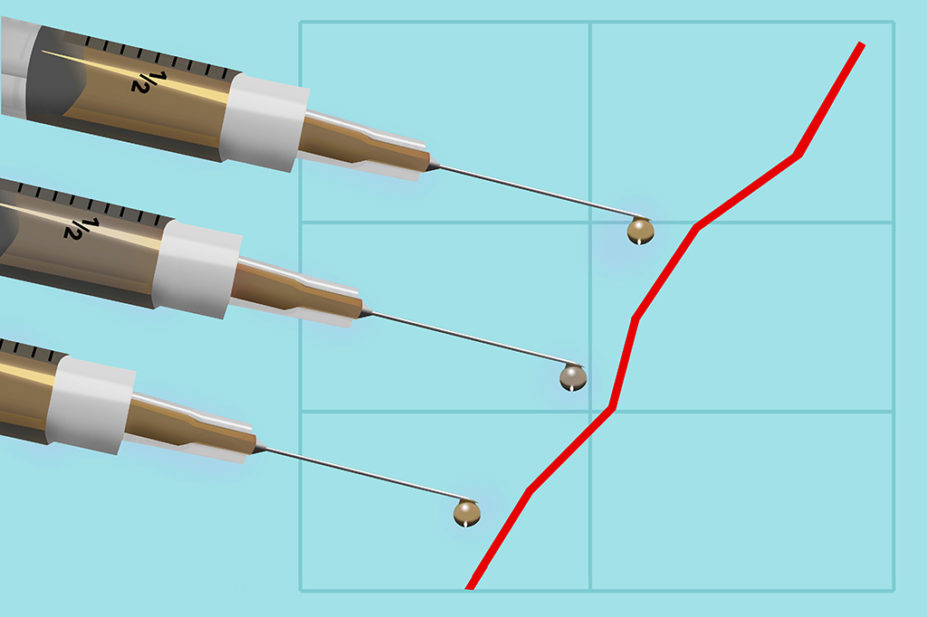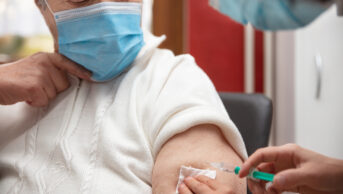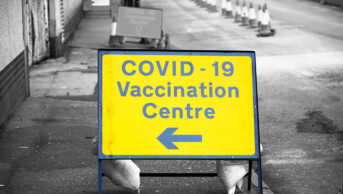
Shutterstock.com
Open access article
The Royal Pharmaceutical Society has made this article free to access in order to help healthcare professionals stay informed about an issue of national importance.
To learn more about coronavirus, please visit: https://www.rpharms.com/coronavirus
Mentions of a COVID-19 booster campaign have been floated in government documents since February 2021. But now that Sajid Javid, who replaced Matt Hancock as the health and social care secretary at the end of June 2021, pushes the UK towards “learning to live with the virus”, plans are starting to take shape.
Javid — who only took office five days before government advisers published provisional guidance on what a booster campaign might look like — touted a third jab as being vital in protecting “freedom in this country”.
However, many uncertainties remain. Data are still being collected on how long immunity lasts following the first two doses of COVID-19 vaccines. And clinical trials to find out which vaccine works best as a booster jab, and whether it can be administered at the same time as a flu jab, are ongoing.
What is certain is the important role for pharmacies in the booster campaign. They are “well placed to co-administer both COVID-19 and flu vaccinations” as part of the programme, if it is finalised, says Alastair Buxton, director of NHS services at the Pharmaceutical Services Negotiating Committee.
With plans for a COVID-19 booster campaign still to be confirmed ahead of its proposed September 2021 start, here is what we know so far.
What is a ‘booster vaccine’?
A booster vaccine is designed to strengthen our body’s immune response to an antigen that it has previously been primed to respond to. These are commonly used to protect against tetanus and polio, where, after time, our immunity against the antigen wanes.
In April 2021, the Department of Health and Social Care announced that it had ordered an extra 60 million doses of the Pfizer/BioNTech vaccine to use as part of the booster campaign, alongside the Oxford/AstraZeneca and Moderna vaccines. These will be the same as the vaccines that are currently being administered as first and second doses.
The Joint Committee on Vaccination and Immunisation (JCVI) has confirmed that the UK has placed orders for other COVID-19 vaccines — such as Valneva and Novavax — which may become available for use in a booster programme and will be reviewed by the committee once the vaccines receive regulatory approval.
Will the booster vaccine have to be the same as the previous doses?
A clinical trial in the UK is still underway to find out how people’s immune systems respond when given a booster vaccination that is a different type to their first two doses.
COV-BOOST includes 2,886 participants and is looking to find out which vaccines against COVID-19 are most effective as a booster vaccination, depending on which vaccine was used to provide the initial two-dose course. Seven COVID-19 vaccines are being trialled: Oxford/AstraZeneca, Pfizer/BioNTech, Moderna, Novavax, Valneva, CureVac and Janssen.
On 9 September 2021, the Medicines and Healthcare products Regulatory Agency (MHRA) approved the Pfizer/BioNTech and Oxford/Astrazeneca vaccines for use “as safe and effective booster doses”, ahead of the final decision from the JCVI on whether a booster vaccination programme would be necessary.
The government is also reported to have entered into talks with AstraZeneca to order a COVID-19 vaccine that specifically targets variants of the virus. However, the JCVI has said these vaccines “will not be available in time for booster revaccination [in autumn 2021]” but will be considered by the committee “in due course”.
Why do we need a booster campaign?
The booster vaccination campaign is aimed at protecting the population against COVID-19 during the winter months when pressures on the NHS are most acute.
According to the JCVI’s advice, protection against severe COVID-19 offered by the Pfizer/BioNTech, Oxford/Astrazeneca and Moderna vaccines last “at least six months for the majority” from the second dose, after which time patients will require a booster vaccine to provide continued protection.
However, this has since been doubted by experts. In August 2021, Prof Sir Andrew Pollard told the All-Party Parliamentary Group on Coronavirus that “even as the levels of immunity start to drop… our immune system still remembers that we were vaccinated”.
“If there was any fall off in protection, it is something that will happen gradually and it will happen at a point where we can pick it up and be able to respond,” he said.
Adam Finn, a professor of paediatrics at the University of Bristol and a member of the JCVI, also told the BBC that while some immunosuppressed patients would need a booster jab, it may not be necessary for everyone over the age of 50.
The booster jab is also expected to add resilience against variants of the virus, particularly the delta variant, which is currently considered to be the dominant strain in the UK and has been found to be around 60% more transmissible than the original strain of the virus.
NHS England has advised sites to plan to deliver booster doses over the 15 weeks between 6 September and 17 December 2021.
The NHS in Wales and Scotland is yet to specify the dates of their booster campaigns but both governments have said planning is underway for programmes to start in September 2021.
Who will get one?
The JCVI has said in its interim guidance — ahead of final advice that is expected in September 2021 — that the booster campaign should take place over two stages.
The first stage, which would cover more than 15 million people in the UK, will offer a third dose of COVID-19 vaccine and a flu vaccine to patients in the following groups, as soon as possible from September 2021:
- adults aged 16 years and over who are immunosuppressed;
- people living in residential care homes for older adults;
- all adults aged 70 years and over;
- adults aged 16 years and over who are considered clinically extremely vulnerable;
- frontline health and social care workers.
The second stage, which includes more than 17 million people in the UK, should include the following groups, “with equal emphasis on deployment of the influenza vaccine where eligible”, the JCVI said:
- all adults aged 50 years and over;
- adults aged 16–49 years who are in an influenza or COVID-19 at-risk group;
- adult household contacts of immunosuppressed individuals.
Younger patients who have received their second dose of COVID-19 vaccine in late summer will be considered for a third dose “at a later time”. The JCVI is also considering COVID-19 vaccinations for children following the Medicine and Healthcare products Regulatory Agency’s approval of the Pfizer/BioNTech vaccine for those aged 12 years and over.
While the JCVI continues to deliberate the potential benefits of a booster vaccine, they have recommended that people with severely weakened immune systems receive a third vaccine dose at least 8 weeks after the second dose. This is expected to be administered in addition to a booster jab “around six months after their third primary dose, pending further advice”.
The advice follows the publication of preliminary data from the OCTAVE trial, which showed that almost everyone who was immunosuppressed mounted an immune response after two doses. However, in around 40% of people, the levels of antibodies were low.
Who will provide booster jabs?
The booster jabs will be administered through the same delivery model as the first two doses — through vaccination centres, as well as sites led by primary care networks and community pharmacies.
Community pharmacy will play an important role in England. In a letter to all community pharmacy teams on 1 July 2021, NHS England said it would be commissioning an additional 1,000 community pharmacy sites to administer booster jabs to eligible patients. However, the letter added that this would be “subject to interest and system needs”.
Pharmacies that can provide 100 vaccinations per week are now eligible to express interest in becoming a COVID-19 vaccination site in time for the booster campaign. Previously, pharmacies needed to commit to delivering either 400 or 1,000 vaccinations per week.
If all of these sites come on stream, this would more than double the number of community pharmacy-led COVID-19 vaccination sites in England, with 688 commissioned as of 26 July 2021. The additional sites are expected to contribute to the delivery of 3.5 million vaccinations per week, with 25–60% delivered outside of general practice, in community pharmacies or vaccination centres.
Pharmacies that become designated COVID-19 booster jab sites will be obligated to provide the vaccines until the contract ends on 31 January 2022, or until six weeks after the contractor gives notice that the site will stop providing the jabs.
However, in Scotland and Wales, the situation is less clear for local pharmacies. Community Pharmacy Scotland has said that there are “no solid plans” to engage community pharmacies in the booster campaign. To date, only a small number of remote and rural pharmacies have participated in COVID-19 vaccinations.
In Wales, 20 pharmacies have been involved in the vaccination programme so far and first minister Mark Drakeford told the Senedd on 29 June 2021 that the sector would “be part of the mixed repertoire of vaccine provision for the future”, although what that means remains to be seen.
Who will be able to administer the booster shots?
Advice on who can administer COVID-19 vaccines has not changed ahead of the booster campaign.
Throughout the vaccination programme, the NHS has promised additional workforce to support sites providing COVID-19 vaccines, “including non-registered trained vaccinators”, using the national protocol and national agreements with volunteering organisations.
The national protocol was published in January 2021 and allows “those who are registered healthcare professionals who cannot operate under a [patient group direction], and those who are not registered healthcare professionals, to safely administer a licensed or temporarily authorised COVID-19 or influenza vaccine”. This includes pharmacy technicians.
NHS England has advised vaccination sites to maximise the use of volunteers wherever possible, with further workforce and training guidance for the booster campaign to be released shortly.
Are we going to have to give boosters every year?
Whether COVID-19 vaccinations will become an annual occurrence has yet to be determined. But The Times revealed that the government has already started ordering Pfizer/BioNTech vaccines for a booster campaign in autumn 2022.
Chris Whitty, chief medical officer for England, previously said that he expects that over the next two or three years “new variants may well lead to us having to revaccinate, or consider at least boosting vaccinations, as they come through”.
However, in five years, Whitty said he would expect polyvalent vaccines to have been developed that “hold the line to a very large degree against even new variants as they come in”.
Can the COVID-19 booster jab be given at the same time as the flu vaccine?
This is still uncertain. In interim guidance published on 30 June 2021, the JCVI advised a “synergistic approach” to the delivery of COVID-19 and flu vaccines as this would maximise uptake in what could be a flu season that’s “50% larger than typically seen”.
The NHS says that co-administration will be “actively enabled and encouraged” but finalising this decision will only be possible once the results of a clinical trial looking at the effectiveness of the two vaccines when administered at the same time are published. It added in a letter to community pharmacies on 14 July 2021, that co-administration arrangements will be put in place in NHS trusts, residential care homes, for housebound patients and for those in other residential settings.
The trial — ComFluCov — has 756 participants and the results are expected in late summer 2021.
Useful links
Important dates
19 July 2021 — UK government expects to have vaccinated all those aged over 18 years with a first dose and two-thirds of adults with a second dose. All social distancing restrictions are lifted.
28 July 2021 — Deadline for contractors to express interest in delivering COVID-19 booster jabs.
Before September 2021 — Final advice from the Joint Committee on Vaccination and Immunisation outlining who should receive a booster COVID-19 vaccine and when.
During September 2021 — Newly approved vaccination sites go live.
6 September 2021 — COVID-19 booster campaign begins in England.
31 October 2021 — Local Enhanced Service (LES) contract for pharmacies delivering the first two COVID-19 jabs ends.
17 December 2021 — COVID-19 booster campaign ends in England.
31 January 2022 — LES contract for pharmacies delivering the COVID-19 booster jab ends.


